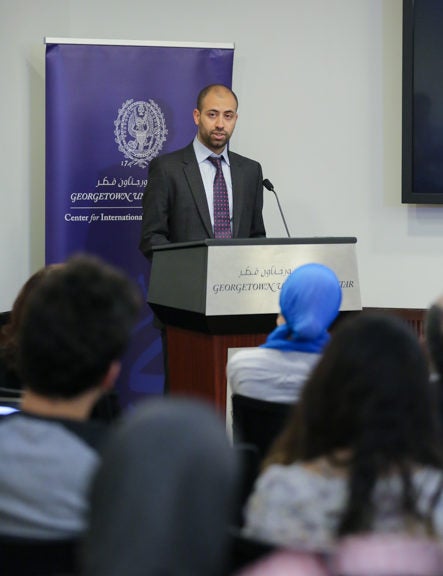Georgetown Professor Explores Islamism and Nationalism in the Middle East

Islamist movements and concepts of national identity were under discussion at Georgetown University in Qatar’s Center for International and Regional Studies (CIRS) recently, as the research institute hosted a lecture by Professor Abdullah Al-Arian. Al-Arian, a CIRS faculty fellow, shared details of his new book, tentatively titled Brothers Behind Borders: Islamism and Nationalism in the Middle East, which focuses on the historical role of Islamic social movements in the Arab world.
Speaking to an audience of students, staff, faculty, and guests at the University’s Education City campus, Al-Arian laid out some of the findings and initial conclusions from his research. The history scholar visited ten countries in the Middle East region while working on the book, conducting fieldwork on the various Islamic groups operating there.
In his lecture, Al-Arian warned against the tendency to paint all Islamic groups with the same brush, highlighting the difference between violent groups and the peaceful organizations involved in social issues and charitable acts. “In the face of growing extremist movements, it is perhaps more important than ever to distinguish between them,” said Al-Arian.
Al-Arian explained how, in the early 20th century, Middle Eastern national identities tended to exclude religious groups, as countries in the region (many of whom were under colonial rule) focused on modernizing their political systems to be in line with more secular countries. Islamist movements were often seen as competitors seeking to undermine or challenge the national identities put forward by the state.
Following these constraints, some groups adapted to the political landscape or shifted to meet the needs of the majority of the population. This is why branches of the same group can have very different ideas and aims in different countries. “The evolution of Islamist movements cannot be divorced from their social, political, and economic contexts,” explained Al-Arian.
Brothers Behind Borders is Al-Arian’s second book, which aims to write Islamic social movements back into the national histories of their respective states. The scholar is a professor of history at Georgetown University in Qatar and holds a Ph.D. from Georgetown University’s Main Campus in Washington, D.C.